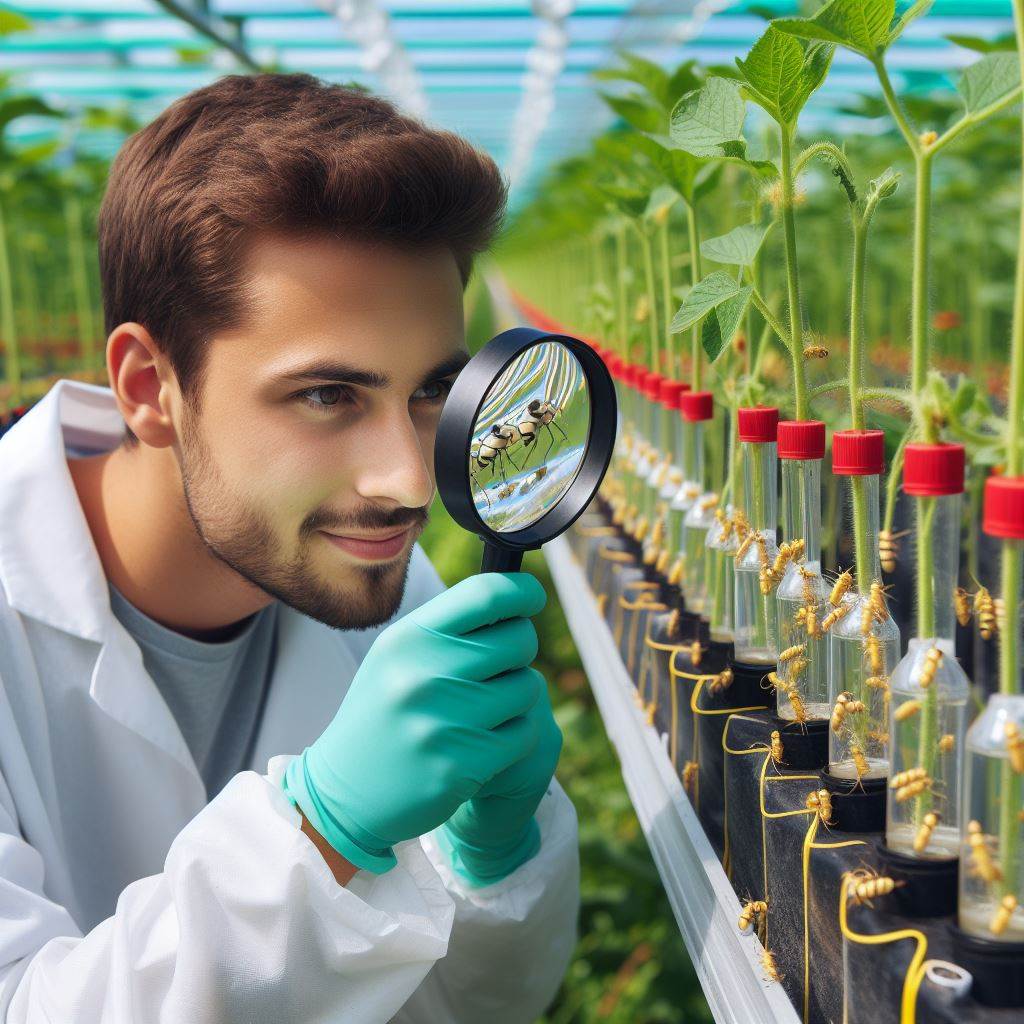Introduction
Sustainable farming practices are crucial for the long-term health and productivity of our planet.
One vital aspect of sustainable farming is Integrated Pest Management (IPM), which plays a key role in ensuring the success of sustainable farming methods.
Sustainable farming aims to minimize the negative impact of agricultural practices on the environment while maximizing productivity.
It focuses on preserving natural resources, reducing pollution, and maintaining ecological balance.
By adopting sustainable techniques, farmers can contribute to the preservation of biodiversity and protect the health of our ecosystems.
IPM is an effective and environmentally friendly approach to pest management that reduces the reliance on synthetic pesticides.
It integrates various pest control methods, such as biological control, crop rotation, and habitat manipulation, to prevent and manage pest infestations.
IPM not only helps in reducing crop damage but also enhances the overall health and quality of the farm.
By using IPM, farmers can effectively manage pests while minimizing the negative impacts on the environment and human health.
This approach promotes the use of organic and natural pest control methods, reducing chemical inputs and their associated risks.
IPM empowers farmers with a sustainable, long-term solution that ensures the success of their farming practices.
In short, sustainable farming is essential for preserving our planet’s health and productivity.
IPM serves as a valuable tool in achieving sustainable agriculture by enabling farmers to manage pests effectively while minimizing environmental and health risks.
By embracing IPM, farmers can become proactive stewards of the land and work towards a harmonious coexistence with nature.
What is IPM
In this section, we will delve into the concept of Integrated Pest Management (IPM) and its significance in empowering sustainable farmers.
Transform Your Agribusiness
Unlock your farm's potential with expert advice tailored to your needs. Get actionable steps that drive real results.
Get StartedIPM is a holistic approach to pest control that aims at minimizing the use of chemical pesticides and promoting natural alternatives.
It involves a combination of different strategies that work together to effectively manage pests while ensuring environmental sustainability.
Definition of IPM
So, what exactly is IPM? IPM can be defined as an integrated and sustainable approach to managing pests in agricultural systems.
It aims to strike a balance between pest control and the preservation of ecological integrity.
Unlike conventional pest control methods that predominantly rely on chemical pesticides, IPM incorporates various techniques to prevent, monitor, and control pests, with the ultimate goal of minimizing the indiscriminate use of harmful chemicals.
Components of IPM
IPM consists of several key components that contribute to its effectiveness. First and foremost, it emphasizes the importance of prevention.
Farmers implementing IPM practices focus on maintaining healthy crops and creating an environment that is unfavorable for pests to thrive.
This includes appropriate crop selection, crop rotation, and soil health management.
Secondly, IPM advocates for the monitoring and identification of pests.
Regular monitoring enables farmers to detect pests early on and accurately identify the specific species causing damage.
This knowledge is crucial in implementing targeted control measures and understanding the pest’s life cycle, behavior, and vulnerabilities.
Once pests are detected, IPM utilizes a combination of biological, cultural, mechanical, and chemical control methods.
Biological control involves the use of natural enemies such as predators, parasites, or pathogens to suppress pest populations.
Cultural control practices focus on altering the farming system to reduce pest pressure, such as through intercropping or adjusting planting dates.
Mechanical control methods include physical barriers, trapping, or handpicking pests.
Chemical control, although minimized in IPM, can still be used when necessary, but in a judicious and targeted manner.
Benefits of implementing IPM
Implementing IPM brings numerous benefits to farmers, the environment, and society as a whole.
Firstly, it significantly reduces the reliance on chemical pesticides, which can have harmful effects on human health and the environment.
By minimizing pesticide use, IPM mitigates the risk of pesticide resistance and the development of secondary pests.
This saves farmers money on pesticide purchases and reduces the potential for pesticide contamination in soil, water, and food.
Moreover, IPM promotes biodiversity by protecting natural enemies of pests.
It enables beneficial insects, birds, and other organisms to thrive, contributing to a healthier and more balanced ecosystem.
Additionally, IPM supports the conservation of pollinators, such as bees, by avoiding the use of insecticides that can harm them.
Furthermore, IPM enhances economic sustainability for farmers.
Showcase Your Farming Business
Publish your professional farming services profile on our blog for a one-time fee of $200 and reach a dedicated audience of farmers and agribusiness owners.
Publish Your ProfileBy adopting integrated management strategies, farmers can improve crop yields and reduce crop losses caused by pests.
This translates into increased profitability and a more stable income. Additionally, IPM practices are often compatible with organic farming methods, enabling farmers to tap into the growing demand for organic produce.
In fact, IPM is a comprehensive approach that empowers sustainable farmers by minimizing the use of chemical pesticides and promoting natural alternatives.
Through a combination of prevention, monitoring, and targeted control measures, IPM successfully manages pests while safeguarding environmental and human health.
By adopting IPM practices, farmers can enjoy the benefits of increased profitability, improved crop yields, and a more sustainable future for agriculture.
Read: IPM: Reducing Pesticides, Boosting Yields
The Need for IPM Training
Implementing Integrated Pest Management (IPM) practices is crucial for the sustainability of farmers and their crops.
However, many challenges hinder farmers from effectively applying IPM techniques.
Challenges faced by farmers in implementing IPM:
- Limited access to information and resources necessary for proper IPM implementation.
- Inadequate understanding of pest behavior, identification, and control methods.
- Lack of awareness about alternative pest management strategies beyond conventional chemical-based approaches.
- Inability to properly monitor and assess pest populations and crop health.
- Limited understanding of the potential environmental and health risks associated with certain pest control methods.
The above challenges highlight the need for specialized IPM training among farmers.
Lack of knowledge and skills
The success of IPM largely depends on farmers’ ability to assess and understand the dynamic nature of pest problems.
Without appropriate training, it is challenging for farmers to acquire the necessary knowledge and skills to implement IPM effectively.
Specialized IPM training equips farmers with:
- Comprehensive knowledge about pests, their life cycles, and their interaction with crops.
- Skills in pest identification, accurate monitoring, and early detection.
- An understanding of ecological principles and how they relate to pest management.
- Expertise in implementing a range of pest control methods, including biological, cultural, and chemical strategies.
- Knowledge of safe handling and application of approved pesticides.
With these competencies, farmers have the capacity to optimize pest management while minimizing risks to human health and the environment.
Importance of specialized training for effective IPM implementation
Specialized IPM training programs are crucial for farmers to overcome the challenges they face and successfully implement IPM on their farms.
Benefits of specialized training include:
- Enhanced understanding of IPM principles, leading to improved decision-making in pest management.
- Improved pest monitoring and early detection, enabling timely intervention and prevention of crop damage.
- Reduced reliance on synthetic pesticides through the adoption of alternative pest control methods.
- Increased awareness of the impact of pesticide use on human health and the environment, encouraging responsible practices.
- Access to up-to-date information on the latest IPM research, technological advancements, and best practices.
Training programs should offer a combination of theoretical knowledge and practical hands-on experience.
They should be tailored to the specific needs of farmers in different regions, considering local pests, environmental conditions, and available resources.
By empowering farmers with specialized IPM training, we can promote sustainable agriculture, protect the environment, and ensure healthy and safe food production for generations to come.
Read: Chemical-Free IPM: Pros and Cons
The Importance of Empowering Farmers
Empowering farmers for a sustainable future
Empowering farmers is crucial for the long-term sustainability of agriculture and the overall well-being of our planet.
Farmers are the backbone of our food production systems and their role in feeding the growing global population cannot be overstated.
However, traditional farming practices often rely heavily on the use of harmful pesticides and chemical fertilizers, leading to a variety of environmental and health issues.
This is where Integrated Pest Management (IPM) training plays a significant role.
Providing access to IPM training and resources
IPM training equips farmers with the knowledge and skills to manage pests and diseases in a more sustainable and environmentally-friendly manner.
By providing farmers with access to IPM training and resources, we can empower them to make informed decisions about pest control methods.
IPM training educates farmers on the importance of using natural predators, crop rotation, and biological controls to reduce the reliance on chemical pesticides.
This not only benefits the environment by minimizing the harmful impact of pesticides but also helps to maintain the natural balance of ecosystems.
Moreover, by adopting IPM practices, farmers can enhance the overall quality and yield of their crops, leading to better economic outcomes.
Enhancing farmers’ decision-making skills
IPM training goes beyond just providing farmers with knowledge about sustainable pest management techniques.
It also enhances farmers’ decision-making skills by teaching them how to monitor and assess pest populations, as well as identify beneficial insects.
Through IPM training, farmers learn to identify the early signs of pest infestations and take proactive measures to prevent extensive damage.
This empowers farmers to make informed decisions about the most appropriate pest control methods for their specific crops and growing conditions.
Furthermore, IPM training encourages farmers to consider the long-term impacts of their actions on the environment, such as water and soil quality.
By equipping farmers with the ability to make sustainable choices, we are contributing to the preservation of our natural resources for future generations.
In summary, empowering farmers through IPM training is essential for creating a sustainable and environmentally-friendly future.
By providing access to training and resources, we enable farmers to make informed decisions about pest management, leading to better agricultural practices.
Not only does this benefit the environment, but also the overall well-being of farmers and the communities they serve.
Through enhanced decision-making skills, farmers can contribute to the long-term sustainability of agriculture and ensure food security for all.
Read: Cultural Practices in IPM for Soil Health

Approaches to IPM Training
When it comes to IPM training, there are various approaches that can be employed to empower sustainable farmers.
Showcase Your Farming Business
Publish your professional farming services profile on our blog for a one-time fee of $200 and reach a dedicated audience of farmers and agribusiness owners.
Publish Your ProfileThese approaches include classroom training, practical field demonstrations, workshops and conferences, and online training resources.
Classroom Training
One of the traditional approaches to IPM training is through classroom sessions.
In these sessions, farmers gather in a designated space to learn and discuss various IPM techniques and strategies.
Trainers provide lectures, presentations, and demonstrations to educate farmers about pest identification, monitoring, and management.
During the classroom training, farmers are exposed to different pest control methods, such as biological controls, cultural practices, and the judicious use of pesticides.
They also learn about the importance of biodiversity, crop rotation, and proper sanitation in pest management.
Classroom training allows farmers to interact with trainers and fellow farmers, fostering a sense of community and shared experiences.
It provides a platform for open discussions, raising concerns, and gaining practical insights from experts in the field.
Practical Field Demonstrations
In addition to classroom training, practical field demonstrations play a crucial role in IPM training.
These demonstrations involve hands-on experiences in the field, allowing farmers to witness IPM techniques in action.
Trainers guide farmers through the process of implementing IPM strategies on their own farms.
They demonstrate proper pest scouting, monitoring, and decision-making processes.
Farmers are taught how to identify beneficial insects, assess pest populations, and make well-informed pest management decisions.
Field demonstrations also cover topics such as the correct application of biological controls, the use of traps and pheromones, and the integration of pest-resistant crop varieties.
Farmers get to witness the positive impact of IPM techniques on their own crops, leading to increased confidence in adopting sustainable farming practices.
Workshops and Conferences
Workshops and conferences provide a dynamic and interactive platform for IPM training.
These events bring together farmers, researchers, extension agents, and industry professionals to share knowledge and experiences.
During workshops, participants actively engage in group discussions, case studies, and problem-solving exercises.
They learn from each other’s successes and challenges, gaining valuable insights on IPM implementation across different farming systems.
Conferences, on the other hand, attract experts from various fields of research and industry.
Farmers get the opportunity to attend keynote sessions, presentations, and panel discussions led by renowned experts.
They stay updated with the latest advancements in IPM research, innovative technologies, and best practices.
Online Training Resources
With the advancement of technology, online training resources have become increasingly accessible for farmers seeking IPM knowledge.
These resources include webinars, video tutorials, interactive modules, and online courses.
Farmers can access online training materials at their own convenience, allowing flexibility in their learning.
They can revisit the content multiple times, pause and rewind videos, and take quizzes to test their understanding.
Online platforms also provide forums or discussion boards for farmers to seek clarification and share experiences.
Online training resources offer a wide range of topics, covering specific pest management issues, crop-specific IPM practices, and advanced techniques.
Farmers can enhance their knowledge, acquire new skills, and stay updated with emerging trends in IPM.
In general, IPM training employs various approaches to empower sustainable farmers.
Classroom training enables farmers to learn from experts and interact with their peers, while practical field demonstrations provide hands-on experiences.
Workshops and conferences foster knowledge sharing and networking, and online resources offer flexibility and accessibility.
By investing in IPM training, farmers can enhance their abilities to manage pests while promoting long-term sustainability in agriculture.
Read: Tech Advances in IPM for Sustainability
Case Studies: Successful IPM Training Programs
Implementing Integrated Pest Management (IPM) practices is crucial in empowering sustainable farmers.
By providing comprehensive training programs, farmers gain the knowledge and skills necessary to combat pests while minimizing environmental impact.
Highlighting examples of successful IPM training initiatives
- Kenya: The Kenyan government partnered with local NGOs to establish IPM training programs aimed at small-scale farmers. Through these initiatives, farmers learned various pest management techniques, such as crop rotation and biological control.
- India: In India, a non-profit organization conducted IPM workshops for farmers in rural areas. The workshops focused on teaching farmers how to identify pests, scout fields for infestations, and implement biological control methods effectively.
- Costa Rica: The Costa Rican Ministry of Agriculture developed an IPM training program, emphasizing the use of cultural practices like intercropping, to reduce the reliance on chemical pesticides. Farmers who adopted these practices experienced higher crop yields and decreased pesticide costs.
Impact on farmers’ practices and outcomes
- Reduced pesticide use: Farmers who received IPM training significantly reduced their reliance on chemical pesticides, minimizing the potential negative effects on human health and the environment.
- Increased crop yields: By adopting IPM practices, farmers could effectively manage pests, resulting in improved crop health and increased yields.
- Enhanced profitability: With reduced pesticide costs and higher crop yields, farmers practicing IPM reported increased profitability, leading to improved livelihoods and sustainable farming.
- Better pest identification: IPM training equips farmers with the knowledge to accurately identify pests and distinguish between harmful and beneficial insects. This enables targeted intervention strategies, reducing unnecessary pesticide application.
Improvement in sustainable farming practices
- Conservation of natural resources: IPM training emphasizes the use of environmentally friendly methods, such as biological control and crop rotation. By reducing dependence on synthetic inputs, farmers contribute to the conservation of soil health and water resources.
- Promotion of biodiversity: IPM encourages farmers to create habitats that support beneficial insects, leading to increased biodiversity within farming systems. This promotes ecological balance and supports natural pest suppression.
- Long-term pest management: Through IPM training, farmers gain a comprehensive understanding of pest life cycles and the factors that contribute to pest outbreaks. This knowledge enables farmers to develop long-term pest management strategies, reducing the need for reactive pesticide use.
- Resilience to climate change: IPM practices contribute to farmers’ resilience in the face of climate change. By implementing diversified cropping systems and biological control, farmers can adapt to changing climate conditions and reduce yield losses due to pest pressure.
In brief, successful IPM training programs have proven instrumental in empowering sustainable farmers worldwide.
These programs not only enable farmers to effectively manage pests but also promote environmentally friendly practices and enhance long-term agricultural sustainability.
Through further investment in IPM training initiatives, we can continue to support farmers in adopting sustainable farming practices and ensure a sustainable future for agriculture.
Government and NGO Initiatives
Government agencies play a crucial role in promoting Integrated Pest Management (IPM) training for sustainable farmers.
Showcase Your Farming Business
Publish your professional farming services profile on our blog for a one-time fee of $200 and reach a dedicated audience of farmers and agribusiness owners.
Publish Your ProfileThey recognize the importance of empowering farmers with knowledge and skills to adopt sustainable farming practices.
Role of government agencies in promoting IPM training
- Developing and implementing training programs: Government agencies develop comprehensive IPM training programs tailored to the needs of local farmers. These programs cover various aspects of pest management, including prevention, monitoring, and control.
- Collaborating with research institutions: Governments partner with research institutions to conduct studies and trials on effective IPM techniques. The findings are used to enhance the training curriculum and provide evidence-based solutions.
- Ensuring compliance: Government agencies establish regulations and standards for pesticide use. They incorporate IPM principles into these regulations, promoting responsible pesticide management and encouraging farmers to seek training.
- Promoting knowledge-sharing platforms: Governments create platforms, such as agricultural extension services and online forums, to facilitate the exchange of IPM knowledge and experiences among farmers. These platforms promote continuous learning and support networks.
Partnerships with non-profit organizations
Government agencies often collaborate with non-profit organizations (NGOs) to expand the reach and impact of IPM training initiatives.
- NGOs as implementation partners: NGOs with expertise in agriculture and sustainable farming practices partner with government agencies to implement IPM training programs. They assist in organizing workshops, providing training materials, and offering technical support to farmers.
- Targeting specific communities: NGOs often focus on marginalized or disadvantaged farming communities. They work closely with the government to identify these communities and provide them with tailored IPM training solutions.
- Advocacy and awareness campaigns: NGOs play a crucial role in raising awareness about the benefits of IPM training. They collaborate with government agencies to conduct advocacy campaigns, highlighting success stories and encouraging farmers to participate in the training programs.
- Mobilizing resources: NGOs help mobilize resources, such as funding and technical expertise, to support IPM training initiatives. They often seek partnerships with the private sector and donor agencies to secure additional resources for farmers.
Funding opportunities for farmers to access IPM training
Government agencies and NGOs provide various funding opportunities to ensure farmers can access and benefit from IPM training.
- Grants and subsidies: Governments offer grants and subsidies to farmers, covering a portion or the entire cost of IPM training programs. This reduces the financial burden for farmers and encourages their participation.
- Microfinance and credit schemes: NGOs, in collaboration with financial institutions, provide microfinance and credit schemes specifically designed for farmers. These schemes enable farmers to access funds for IPM training without facing significant financial constraints.
- Scholarships and fellowships: Government agencies and NGOs provide scholarships and fellowships to aspiring farmers who wish to pursue advanced IPM training. This promotes capacity building and ensures the availability of skilled professionals in the agricultural sector.
- Corporate partnerships: Governments and NGOs forge partnerships with private corporations. These partnerships facilitate corporate funding for IPM training programs, creating a win-win situation where corporations fulfill their corporate social responsibility while supporting sustainable farming practices.
In review, government agencies, in collaboration with NGOs, actively promote IPM training among sustainable farmers.
Through training programs, partnerships, and funding opportunities, they empower farmers to adopt effective pest management practices and contribute to sustainable agriculture.
Conclusion
IPM training is crucial for empowering sustainable farmers and ensuring the long-term viability of our agricultural systems.
Throughout this section, we have highlighted key points emphasizing the importance of this training.
By adopting IPM practices, farmers can effectively manage pests, reduce the reliance on chemical pesticides, and protect the environment.
IPM training equips farmers with the knowledge and skills to identify pests, understand their behavior, and implement sustainable control methods.
IPM training enables farmers to make informed decisions about pest management, resulting in healthier crops, reduced economic losses, and increased profitability.
It also promotes the conservation of beneficial insects and biodiversity, contributing to the overall health of ecosystems.
In light of these benefits, we strongly encourage farmers to actively seek IPM training opportunities.
Organizations, universities, and agricultural extension services often provide workshops, courses, and resources on IPM.
By investing in their education, farmers can enhance their agricultural practices, improve their resilience to pest issues, and contribute to sustainable farming efforts.
Together, let us embrace IPM training as a powerful tool for empowering sustainable farmers and creating a harmonious balance between agricultural production and environmental stewardship.
By working together, we can build a sustainable food system that nourishes both people and the planet.




